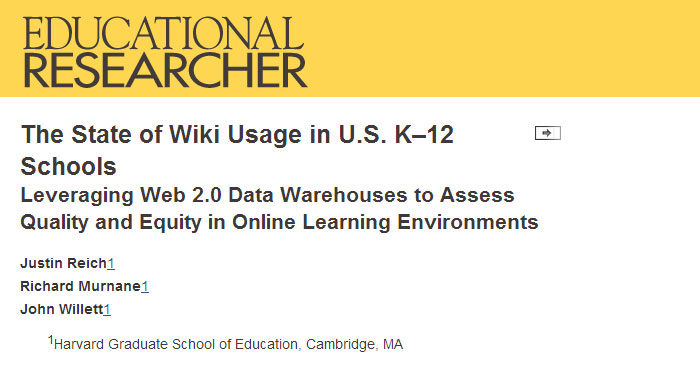With generous funding from the Hewlett Foundation's Open Educational Resources initiative, I started a research project at Harvard University called the Distributed Collaborative Learning Communities project, with PIs Richard Murnane and John Willett, and with consulting assistance from Hunter Gehlbach and Bob Wolf. We studied issues of excellence, equity, and analytics in the use of social media and peer production tools in US, K-12 settings. Our research addressed two questions about one specific peer-production tool, wikis: 1) How are wikis used by teachers and students to support the development of critical skills for career, college and citizenship? 2) Do students from different socioeconomic backgrounds have equitable access to high quality wiki learning environments? I managed and mentored a team that included, over four years, over 35 undergraduates, masters, and doctoral candidates in a research program that conducted over 100 student and teacher interviews, 20 field visits in six states, detailed content analyses of over 1,000 wikis, and quantitative analysis of log data from 180,000 education-related wikis, quality evaluations, school demographic data, and teacher surveys.
This research makes several important contributions to our understanding of learning technologies in a networked era. First, as with many who have examined the use of social media in online learning, I am amazed and inspired by the best projects conducted using wikis. In projects like the Flat Classroom Projects, students develop skills in collaboration, cross-cultural communication, media literacy, and critical thinking. Nonetheless, these extraordinary examples appear to be rare peaks in the landscape of peer-production tools in schools.
Our core substantive findings cohere with results from the last three decades of education technology research: Most wikis reproduced typical classroom dynamics: the majority of wikis disseminated teacher content rather than nurturing student voice and supported individual activity rather than collaboration. Wikis disproportionately benefited affluent learners: wikis created in affluent schools persisted longer and provided more opportunities for 21st century skill development than wikis created in under-resourced schools. These two challenges— the capacity of educational systems to coopt innovation to serve well-established routines and the potential for new technologies to expand educational inequalities—are serious challenges to be faced by advocates of online learning.
Methodologically, our work demonstrates the incredibly exciting potential of online learning environments for educational research. Our research team was capable of studying wikis both in depth, by examining the historical details of every wiki, and at scale, by sampling from hundreds of thousands of learning environments. The instrument we developed, The Wiki Quality Instrument, allowed us to use publicly viewable learning environments to measure opportunities for 21st century skill development across a diverse universe of wiki learning environments. We happened to take an interest in issues specifically related to learning technologies, but in the future, the kinds of analytic techniques have tremendous potential for studying diverse phenomena in education and learning.
Publications
- Justin Reich, Richard Murnane, and John Willett, The State of Wiki Usage in U.S., K-12 Schools, Educational Researcher (paper / supplementary materials)
- Justin Reich, The State of Wiki Usage in U.S., K-12 Schools, (Dissertation)
- The State of Wiki Usage: A Summary for Educators (SSRN)
Wiki Quality Instrument
- The Wiki Quality Instrument: Coding Manual, Training Guidelines, and Coding Protocols (SSRN)
- The Wiki Quality Instrument: The Development of the Wiki Quality Instrument and its Protocols (SSRN)
- The Wiki Quality Instrument: Adaptation Guidelines for Educators and Researchers (SSRN)
Media
- Interview for the MacArthur Digital Media and Learning Initiative (video)
- Radio Berkman, Wikis, Teaching and the Digital Divide (audio)
- Radio Berkman, The Wiki 1% (audio)
- Harvard Graduate School of Education, Thoughts on Digital Equity (video 3 min)
- ISTE Ignite: Will Free Benefit the Rich (video 5 min)
- Hewlett Grantee Meeting, When Open Encounters Different Classrooms (video 10 min)
- Berkman Luncheon, Will Free Benefit the Rich (video 60 min)
Presentation Slides
- Will free benefit the rich: Fighting for technology equity (slides)
- Just posting in the same place: A taxonomy of collaborative behaviors on U.S. K-12 wikis (slides)
- Are great classroom wikis born or made? Using continuous time data to model online community development (slides)
- “Just that they’d followed the directions”: Comparing wiki assessment criteria and 21st century skill domains (With Shane Tutwiler) (slides)
- Scalable, Real-Time, Individual Behavior and Learning (SCRIBL) Data in Web 2.0 environments: A wiki case study (slides)
